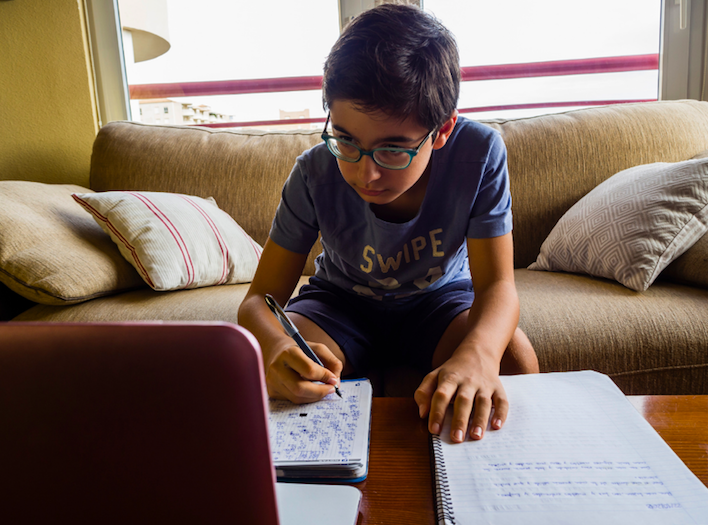With the shift from online learning to in-person, it’s completely understandable that your teen is struggling in school. And you want to know how to help a teen struggling in school. You want your teen to perform at their best ability in school. Every parent wants to see their teen achieve straight A’s and a 4.0 GPA, but it’s oftentimes an unrealistic expectation.
When we approach our teens with stern, unrealistic expectations, we can discourage them from trying their best in school. Perhaps, they may even downplay their academic wins. Such as getting a B on a quiz, or in their class.
It’s important to consider ALL of the contributing factors to why your teen may be struggling in school. Do they have a safe and quiet place to study or complete homework? Is there a good social support system in school and at home? Do they feel comfortable admitting that they need help on something? Could there be stressors in their environment? Such as family conflict or friend issues, that greatly impact them and their moods?
From there, you and your teen can work together to improve and work on these issues head on. If other areas of their life are causing them to struggle (socially, emotionally, mentally), it could reflect in school. Nonetheless, this can all change with some additional support on the side!
You know you want to see your teen be the best they can be. You want them to feel proud of themselves, and accomplish their goals. To help them get to where they want to be, you also need to play a big role in supporting them.
Family counseling in Simi Valley, Ca, offers a safe space for the whole family to grow as a unit.
How to Help a Teen Struggling in School: Shift your expectations at home

For a majority of 2020 and the beginning of 2021, schools were set in an online learning environment. Classes probably weren’t as time consuming. And students were given time to work on assignments or studying at their own pace.
Now, teens are in classrooms for 8 hours a day. Switching between different subjects. Walking around campus, and juggling a bunch of mental tasks. Rightfully so, they are exhausted! School takes up a lot of their physical and mental energy.
For example, perhaps you may perceive your teen as lazy if they are not doing chores right away. You may feel disrespected if your teen is not instantly working to do regular chores right after school.
The reality of the situation is that they are needing time to decompress. School can be mentally draining and exhausting for them. Maybe even leaving them feeling down and defeated if they are not doing well in a class. Additional stress from being reprimanded for not doing chores may make it worse on them.
It’s important to provide them with a safe, supportive environment after school. Although it is still important for them to follow through with chores or cleaning, shift your expectations at home to find a middle ground with them. Perhaps it’s best to establish a certain schedule for chores, which would not be the moment they return from school.
Take some time to understand how their day was, prior to asking them to engage in expectations for chores or cleaning. Let them know their feelings matter. And you are here to listen if they have had a difficult or stressful day. From there, you can come up with a plan that allows them to experience downtime. And time to engage in expected chores or cleaning.
Teen therapy in Simi Valley, Ca, works with your teen while finding ways to include the family as a whole.
How to Help a Teen Struggling in School: Show interest in their class syllabus

At the beginning of each school year or semester, teachers should come prepared with a class syllabus. It outlines weekly assignments and important projects that are scheduled throughout the course. Request a copy of the syllabus from the teacher directly to avoid your teen feeling too monitored.
Without hovering and pressuring them to do assignments, proceed with care and interest about their upcoming due dates and assignments. It’s important to remember that your teen is figuring out their productivity and capabilities around doing assignments; and it will only hinder them from you interfering with pressure to do assignments.
Show interest in whatever projects, assignments, or papers are coming up. Use gentle approaches to bring up, for example, if they have an idea for what they would like to write about. Inquire about some study tools they may plan to use for major exams. Maybe you could even help them with organization skills, such as getting them a calendar or weekly task system!
You want to ensure that your teen is following through with assignments, but not that you are forcing them to start or complete them. Don’t consistently be breathing down their back to micromanage their school year, either.
For example, a way to offer gentle reminders about upcoming assignments could be, “I know you may be on top of things, but I just want to remind you about that project next week. Is there any way I can support you with that?”
Let them know you are here and available to learn and grow with them. That you are interested to understand what they are currently doing in school! Show genuine interest in their work. Help them see that they’re capable of doing whatever they put their minds to.
Family counseling in Simi Valley, Ca helps family members find areas in which they can grow in order to support one another.
How to Help a Teen Struggling in School: Offer support in studying or with homework

Although you may not feel too familiar with your teen’s current academic subjects, put in effort to offer support in studying or homework. For example, if they are struggling to memorize vocabulary words, or study for a language exam, take the time to create flashcards with them. By helping them practice, you’re involving yourself to support them.
By offering to help them in studying, you’re telling them that you’re here to support them in school and that you care about their understanding of subjects. This is also a great way to bond with your teen to understand their academic interests, dislikes, and overall strengths and weaknesses in school. You can use this information as they grow up to understand and empathize with them if they are struggling with their grades in certain courses.
For more difficult topics like chemistry or algebra, you may not know how you can support them. You don’t know how to break down equations, or give them step-by-step guidance on how to solve a problem. It may help them feel supported if you at least try to look through their assignments to see if maybe you get a decent understanding. You can also have your teen teach the subjects to you, which in turn, will also reinforce their own understanding!
In the end, you may not be able to entirely help them with studying or homework. Consider outside support, such as a weekly local tutor for your teen to meet with. You can also try connecting with the teacher directly to see if they have resources, study guides, or tutors within the school that can help as well.
Teen therapy in Simi Valley provides teens with a safe space to process and work through difficult feelings.
Learn more about Simi Psychological Group:
—————————————————————————————————
About Simi Psychological Group: We are a team of psychologists and therapists in Simi Valley, Ca offering an array of therapy services.
At our therapy practice in Simi Valley, Ca we offer Child therapy and family counseling, Teen therapy, Anxiety Treatment, Depression Therapy, Marriage Counseling, and Neuropsychological Testing. Now Offering Online Therapy in Los Angeles and Online Counseling Ventura County

Dr. Novak is the group practice owner and licensed psychologist at Simi Psychological Group a therapy practice in Simi Valley, California. Simi Psychological Group offers a variety of services including trauma therapy, couples therapy, anxiety therapy, teen therapy, and more. Simi Psychological Group emphasizes the importance of creating real change by making sure to get to the root of your struggles.



